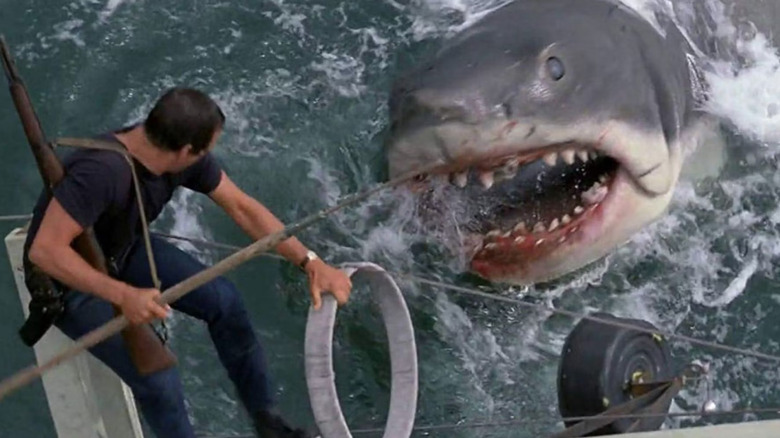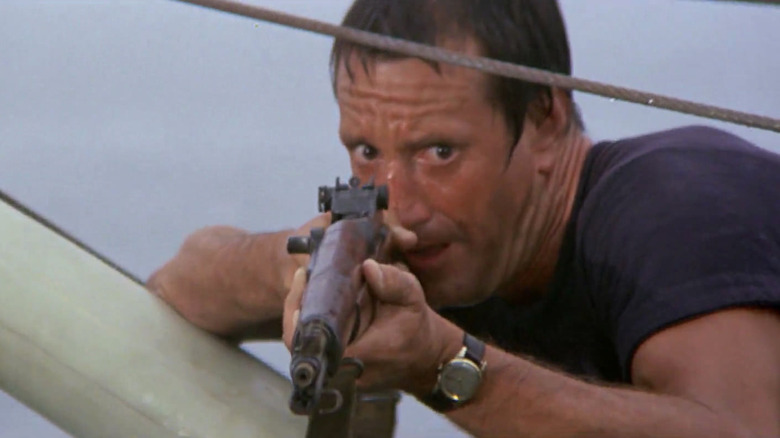Jaws' Original Ending Couldn't Be More Different Than The Steven Spielberg Version
At the end of Steven Spielberg's 1975 creature feature "Jaws," Hooper (Richard Dreyfuss), Brody (Roy Scheider), and the grizzled Quint (Robert Shaw) have piloted a boat out into the ocean around Amity Island to apprehend a great white shark that has been eating the locals. Their initial plan is for Hooper to get in a shark-proof cage and shove a poison-tipped harpoon into the sea beast. The shark proves to be too powerful, however, and wrecks the cage. The shark also has the wherewithal to leap onto the stern of their boat, crushing it. The shark also eats Quint. Things are looking pretty bad.
It's not until Brody drops a pressurized oxygen tank into the shark's mouth and shoots it with a rifle that the animal is killed. The tank blows up, and the fish is reduced to bloody chunks. Hooper and Body, the two survivors, begin paddling back to shore.
"Jaws" was one of the first movies to be released nationwide on one day. Prior to 1975, most films still opened in big cities like Los Angeles and New York, and then toured the country, staying in theaters for months. Adjusted for inflation, "Jaws" has made over $1.2 billion to date. Something about the killer shark struck a chord with audiences, and "Jaws" ushered in the modern blockbuster as we know it.
The film was based on the 1974 novel by Peter Benchley, and it was a largely faithful adaptation. To streamline the story, Spielberg and his screenwriters cut out a few subplots (Hooper doesn't have an affair with Brody's wife in the movie), but the overall plot remained more or less the same. The ending, however, was altered quite a bit. Benchley conceived an ending that was bleak and lonesome, whereas Spielberg wanted to go out on a note of triumph.
Hooper dies in the Jaws book
In Benchley's novel, Hooper also tries confronting the shark from inside a shark-proof cage. Just like in the film, the shark breaks through the cage and Hooper flees. However, as Benchley wrote it, Hooper wasn't able to completely get away from the shark and hide underwater. Instead, the shark bites him to death right at that moment. Spielberg knew how to tug on people's heartstrings, however, and understood that showing a still-living Hooper emerge from the water after his shark attack would have people cheering. Hooper was spared.
Quint dies in both versions, however the circumstance of his death are very different in Benchley's version. As mentioned, Spielberg fed Quint to the shark, only to have Brody kill the beast himself. In the book, Brody is left stranded out in the water while Quint deals the Ahab-like deathblow. As the shark swims toward Brody, hoping for another snack, Quint fires harpoon after harpoon into it. While it swims, the shark eventually succumbs to its harpoon wounds and dies in the water. As the dead shark sinks to the bottom of the ocean, however, a rogue rope gets caught on Quint's foot, and he's dragged under with it. Quint drowns, killed by a shark that's already dead.
This left Brody all alone out in the open water, something he always deeply feared. The monster had been killed, but its deadly legacy will remain forever. Benchley's ending is more appropriate for a horror story, leaving readers with a sense of deep, existential dread.
What Benchley thought of Jaws
In Douglas Brode's 1995 book "The Films of Steven Spielberg," it was written that Benchley, as part of his contract, was allowed to write the screenplay to "Jaws." It was also handy for the studio, as Benchley wasn't part of the writer's union, and they needed a script in the middle of a writers strike. Benchley reportedly wrote three drafts of the script before handing it over to other, more experienced screenwriters. Benchley is credited as one of the writers alongside Carl Gottlieb, who co-wrote "Jaws 2," "Jaws 3-D," "The Jerk," and "Doctor Detroit." Gottlieb also directed the 1981 comedy "Caveman" with Ringo Starr.
Benchley said on his website (which compiled various articles, forwards, and introduction that he has written over the years) that he was impressed with the final screenplay, and he was actually totally okay with certain subplots being cut out for efficiency's sake. Benchley felt that Spielberg's version let the characters stand out a little more sharply. As for the ending, Spielberg made it into something explosive and sensational. Also, Spielberg gave his film a happy ending, which wasn't the point of the novel.
It's hard to say if Benchley's original ending would have made "Jaws" even more popular, but the version we got was certainly popular enough. "Jaws" is re-watched in theaters to this day.


